By Noah Perkins,
Bulletin Correspondent
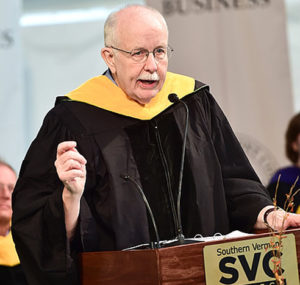
‘I’ve always had ink in my veins. It started at a young, young age when I first went into The Burlington Free Press when I was 6 or 7 years old. I was with my father and was always fascinated by all the activity in the newsroom. So I think that will probably always stick with me.’
—Mike Donoghue. retired reporter
Burlington (Vt.) Free Press
‘He’s a real bulldog as a reporter. He has a nose for news, he’s broken more stories statewide than most reporters ever have the change to.’
—Ross Connelly. Former owner, publisher, editor
Hardwick (Vt.) Gazette
After 47 years as a staff writer for The Burlington (Vt.) Free Press, Mike Donoghue has advice for aspiring journalists: Be willing to do whatever needs to be done, or you’re not going anywhere.
Donoghue has embodied that attitude throughout his long career, a career rife with recognition, with induction into five Halls of Fame, including as a charter member of the New England Newspaper Hall of Fame; as a winner of both the Yankee Quill Award and Matthew Lyon First Amendment Award; being named Journalist of the Year by the New England Society of News Editors; as a National Sunshine Award winner from the Society of Professional Journalists; as a recipient of an honorary degree from Southern Vermont College in Bennington, Vt., his alma mater, in recognition of his career; as the namesake of the New England First Amendment Coalition’s Michael Donoghue Freedom of Information Award; being named 10 times as Vermont Sportswriter of the Year by the National Sportscasters and Sportswriters Association.
Donoghue happily put on whatever hat he needed to wear – sportswriter, general assignment writer, photographer, darkroom technician, copy desk. He even did a three-month stint with the Free Press editorial board.
“He’s a real bulldog as a reporter,” Ross Connelly, until recently owner, publisher and editor at The Hardwick (Vt.) Gazette, said. “He has a nose for news; he’s broken more stories statewide than most reporters ever have the chance to.”
In late October 2015, Donoghue retired from the Free Press after accepting a voluntary buyout offer from the newspaper’s owner, Gannett Co. Inc., based in McLean, Va.
Looking back nearly a half-century, Donoghue pinpointed his career beginnings to his sophomore year at South Burlington (Vt.) High School, when a teacher “cornered” him in the hallway with a demand that would shape his entire adult life.
“He says, ‘What are you doing with your life?’” Donoghue said he was unsure, but the teacher said, “You’re going to write for the student newspaper,” Donoghue recalled. “I said, ‘If I am going to do it, I want to write sports’.”
Two years as sports editor at the student newspaper ignited a passion in Donoghue, who parlayed the experience into a job at the Free Press as a senior in high school.
“I happened to be at the Free Press one day, and I said to the sports editor, ‘You going to need any help covering games this school year?'” Donoghue said. “We talked a little bit; there was a football game on Saturday. He said, ‘Why don’t you cover the game? Bring something in, and if I like it, we’ll talk.’ I brought it in; he liked it. I found a copy of it four years ago. God, is it bad.”
It was 1968, and the Free Press used Donoghue to cover high school and college sports for up to 20 hours a week. Donoghue continued writing for the Free Press while attending St. Joseph College (now Southern Vermont College). Donoghue came home to work weekends that included being the only reporter on duty on Saturday for the Free Press, which did not have a Sunday paper at the time.
Donoghue remembers that, as the lone Saturday writer, he saw “a little bit of everything,” ranging from covering the governor to a recount at City Hall to the more disturbing.
“Early on, there were two 8-year-old boys who drowned on a Friday night, so Saturday that was my assignment,” Donoghue said. “In high school, we lost some people in car accidents, but this was a lot more up-close and personal. It was a sad one. We’ll never know, but the theory is they were fishing, and one fell into the river and the other tried to help him.”
Covering news that emphasized the darker side of humanity – murder, corruption — Donoghue remained unfazed in his approach to reporting. He showed compassion while telling the story.
“They (journalists) always say, ‘We are going to write the first draft of history.’ It’s fascinating to see how things develop, whether it’s public policy with the governor, how laws are shaped — whether it’s public records, open meetings,” Donoghue said.
He was the elected president of the Vermont Press Association from 1983 to 1985 and was a driving force behind allowing the use of cameras and recording devices in Vermont courtrooms. He also got the Vermont Press Association a permanent home in the Journalism Department at St. Michael’s College. Through the years, the Vermont legislature has called on him to help improve both the Public Records Law and Open Meeting Law.
In 1998, Donoghue was one of four Americans selected to speak in Ireland at a journalism conference after the country adopted a Freedom of Information Act. He was joined by the head of the Reporters Committee for Freedom of the Press, the Center for Public Integrity, and a U.S. Justice Department freedom of information officer.
During a stint in the Free Press sports department from 1998 to 2010, he filed freedom of information requests frequently and exposed a major hazing scandal in the University of Vermont hockey program that resulted in cutting the season short. He served on the board of the National Sportscasters and Sportswriters Association and was elected its president for two terms, 2008 to 2010.
He returned to the newsroom to a newly created position of accountability reporter for his final five years at the Free Press.
In retirement, Donoghue leaves a professional legacy that had an impact on and contributed to changes in local and state public policy across Vermont.
Donoghue’s reporting on Vermont’s driving-under-the-influence laws, included buying and analyzing motor vehicle records of offenders with three or more driving-under convictions to find the state’s most frequent offenders. After Donoghue uncovered one driver with 16 such convictions, the Vermont legislature increased the maximum penalty for the third or more driving-under offense from a one-year misdemeanor to a five-year felony.
It was a few months after the investigative series ran that the driver was picked up for No. 17.
Donoghue is also widely known for his investigative reporting into police corruption in Vermont, including excessive force, evidence stealing and evidence planting. He also helped uncover a timesheet fraud case in Vermont State Police that swindled taxpayers out of about $215,000 and temporarily fattened the potential pension of a patrol commander until he went to prison.
“He is one of the most dedicated, dogged journalists I have ever met,” Adam Silverman, content strategist at the Burlington Free Press, said. “He really believes in open government transparency and holding people accountable. He is the kind of journalist who liked to break news every single day, and if he managed to ruffle a few feathers along the way, he was all the happier for it.”
In retirement, Donoghue continues to do freelance gigs. About 10 daily and a dozen non-daily newspapers have reached out to him for news and sports coverage. He also has provided color commentary for college hockey broadcasts the past two winters. For the most part, though, he is trying to focus on his health.
But Donoghue said he still has the “news bug,” and although there have been freelancing assignments, he still finds time to fight for press rights as executive director of the Vermont Press Association and vice president of the New England First Amendment Coalition. Just recently, Donoghue testified at the Vermont State House for laws protecting journalists’ First Amendment rights at the high school, college and professional levels, all levels at which Donoghue has worked.
“I’ve always had ink in my veins,” Donoghue said. “It started at a young, young age when I first went into The Burlington Free Press when I was 6 or 7 years old. I was with my father and was always fascinated by all the activity in the newsroom. So I think that will probably always stick with me.”
His father, John D. Donoghue, was a former journalist in Springfield, Mass., and in Vermont, including a stint as editor of the Vermont Catholic Tribune and as the music critic for the Free Press for 35 years. John Donoghue also is in the New England Newspaper Hall of Fame.
The landscape of professional journalism has changed dramatically from Donoghue’s first year to now. Still, he maintains a staunch optimism about the news industry.
“It’s an exciting time,” Donoghue said. “I think there will be a newspaper forever. I don’t know the format, but there is still going to be news. It was five years ago people were saying the print edition is going to be dead, and here we are.”
Alex Eng, a Bulletin correspondent, contributed to this report.
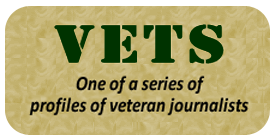
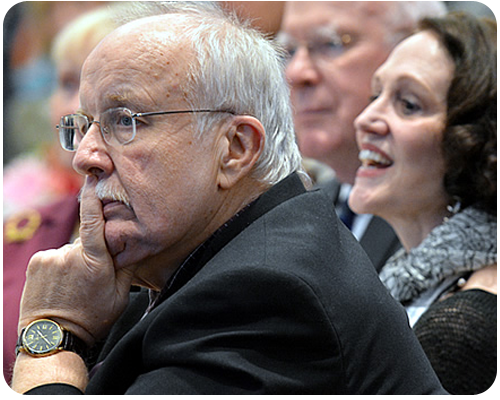
Mike Donoghue strikes a pensive pose at the 2016 New England First Amendment Coalition’s awards luncheon. Donoghue, vice president of the coalition, introduced U.S. Sen. Patrick Leahy, a Vermont Democrat, who received that year’s Stephen Hamblett First Amendment Award. Leahy can be seen behind Donoghue in the photo above.
‘They (journalists) always say, “We are going to write the first draft of history.” It’s fascinating to see how things develop, whether it’s public policy with the governor, how laws are shaped — whether it’s public records, open meetings.’
—Mike Donoghue
‘He is one of the most dedicated, dogged journalists I have ever met. He really believes in open government transparency and holding people accountable. He is the kind of journalist who liked to break news every single day, and if he managed to ruffle a few feathers along the way, he was all the happier for it.’
—Adam Silverman. Content strategist
Burlington (Vt.) Free Press
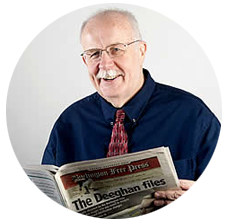
Donoghue with an edition featuring his coverage of a Vermont State Police patrol commander, who went to prison for padding his timesheets to help inflate his pension.
‘It’s an exciting time. I think there will be a newspaper forever. I don’t know the format, but there is still going to be news. It was five years ago people were saying the print edition is going to be dead, and here we are.’
—Mike Donoghue
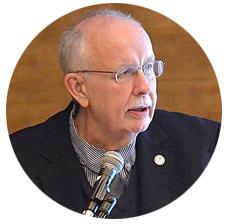
Donoghue introducing Bob Ryan, retired Boston Globe sportswriter and columnist, at this year’s New England Newspaper Hall of Fame dinner. Donoghue nominated Ryan for the Hall of Fame.
Among his many roles …
… as a workshop presenter …
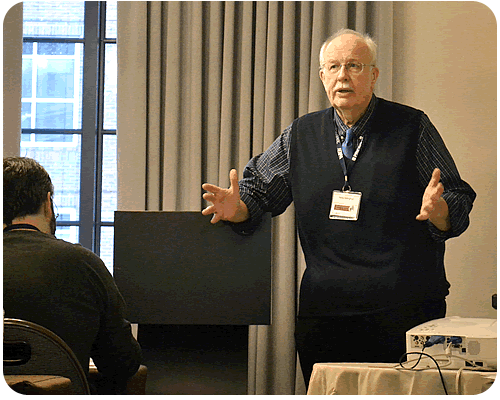
… as a color commentator for college hockey for NSN Sports in Vermont …
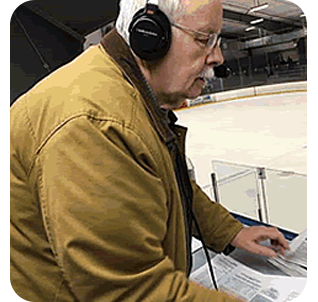
… as an emcee for a Vermont Athletes of the Year awards banquet …
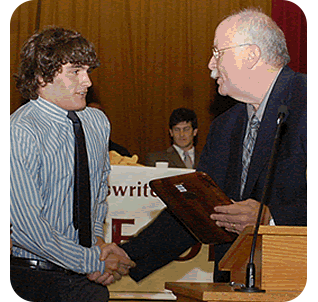
… as a champion of public access.
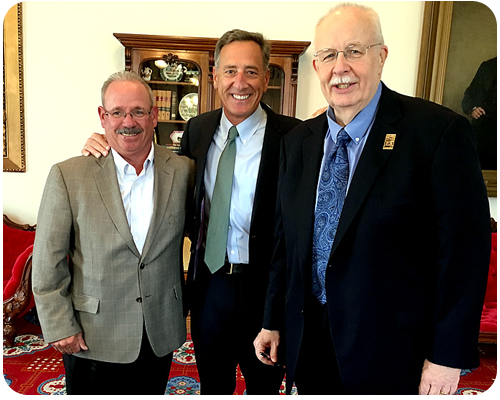
Donoghue is shown above with then-Vermont Gov. Peter Shumlin, at center, who presented Donoghue with the pen Shumlin used to sign into law Vermont’s revised Open Meeting Law in 2016. Shumlin said he was presenting the pen to Donoghue in recognition of his lifelong work to improve public records, government meetings and other transparency issues in Vermont. At left is Joe Choquette, the Vermont Press Association’s lobbyist.
